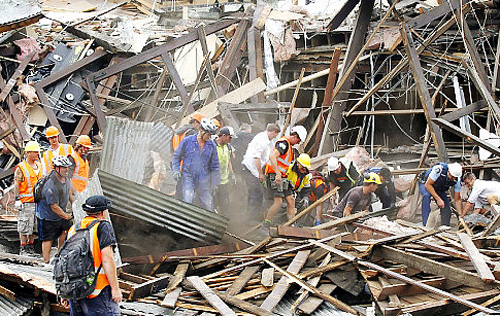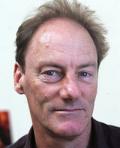
OPINION: The devastation of Christchurch is a national tragedy for New Zealand unsurpassed as a natural disaster since the 1931 Napier earthquake. Having watched similar tragedies regularly played out on TV screens we’re used to seeing Third World countries and the Pacific gripped by death and destruction on a massive scale.
Now our small country is in the centre of the frame.
Prime Minister John Key is right to call it a national disaster and across the country we are all living it and will do so it in the coming days, weeks and months.
John Minto
We feel immense sadness at the stories of personal catastrophe but we also rejoice at the survivors pulled from the rubble and learn their stories. There will be few if any in Christchurch who don’t personally know someone who’s been killed.
Similarly in a small country of four million the upheaval carries across the land. My partner had a nephew who was killed on his way home to be with his wife and two young children after the main earthquake. Tens of thousands of families outside Christchurch will have similar experiences.
Many people have commented that we are at our best in situations like this and it’s true. John Key referred to it as New Zealand’s darkest hour – but it’s also our brightest because the most fascinating and inspiring aspect of any disaster is the shear humanity which is on display from the outset.
People naturally help out complete strangers. Overwhelmingly we co-operate with food, shelter and any assistance needed for neighbours and strangers.
Deeper signal
We take this for granted but it’s a signal of something much deeper. We are communal beings. We shine in ways which astonish us but the real surprise should be that we don’t see this behavior in our day to day lives to anywhere near the same extent as we do in a crisis. The reason is that our normal lives are dominated by economic drivers which work against our natural human instincts.
The economy sets us up as competitors to fight for a bigger share of the economic pie than others. We are encouraged and even conditioned to see ourselves as isolated individuals and families competing for jobs, possessions, money and the better choices which money can buy.
Our economy has always been at odds with our natural instincts. However we have been sold the idea that our life choices arise from our role as consumers in the marketplace rather than from those of interconnected and co-dependent citizens. It’s a bad fit because at heart we deeply respect the lives of our fellow human beings.
We can see just how distorted our real humanity has become when we see the deliberate attacks launched on welfare beneficiaries this week led by political and business elites who want us to see the victims of repeated economic failures as the problem.
The poorest and most vulnerable in the community are being victimised by the rich and powerful after the repeated failure of economic policy to match the real needs of people.
It’s most obvious in jobs. The private sector always fails to provide enough jobs and in fact sees a pool of jobless people as an advantage to keep downward pressure on wages. But politicians and business leaders tell us the unemployed are to blame for our problems and beneficiaries are bludgers.
Economic breakdown
Elsewhere economic failure is seen as the fault of a few bad apples. When more than 30 of our finance companies collapse the media focuses on a couple of scapegoats (such as The New Zealand Herald’s campaign against Mark Hotchin) which mask the much wider economic breakdown. We are led to believe the problem is with just a tiny handful of directors – the bad apples – who face prosecution.
I’m not holding a candle for millionaires driven by greed but the prosecutions of the likes of Rod Petricevic are a sideshow to broader economic failure.
And just as rust never sleeps, so our political leaders and their corporate backers are forever looking for new ways to screw the economic scrum in favour of the well off and as Naomi Klein describes so well in her book Disaster Capitalism, catastrophes such as the Christchurch earthquake provide great opportunities to extend corporate control of our lives.
When New Orleans was rebuilt after Hurricane Katrina for example the poorest areas never got a look in and the new schools built were taken from public control and all set up under private management contracts. In Christchurch the quake will be used to push for such things as commercialized water and wastewater provision and a whole lot more besides.
But disasters remind us there are alternatives to dog eat dog economics. They tell us again that we are human and capable of much better in our day to day lives than the corporate world and their fellow travellers would have us believe.
Cafe Pacific on “A tale of two cities”



